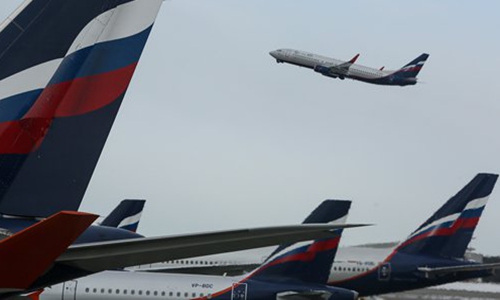Travel ban to dent Russian economy
Tourism-sector losses may hit $200m in Q1: industry insiders

Civil jet airplanes of Aeroflot Russian Airlines File photo: IC
Russia's economy will be hurt to some extent following a ban on Chinese nationals from entering and other restrictive measures, with the country's tourism industry - the first to digest such fallout - estimated to suffer $200 million in losses in the first quarter, industry insiders say.
Prices of necessities such as clothes, food and electronics are elevating in Russia after the closure of major ports bordering China.
Some observers criticized the Russia government's move as an over-reaction that could add burdens to its already-faltering economy.
In stark contrast, China's economy as a whole will be least affected as more than 60 percent of China's imports from Russia are energy products, mostly shipped by underground pipelines that are immune to the impact of the novel coronavirus pneumonia (COVID-19), Chinese analysts pointed out.
Russia issued a ban on Chinese nationals barring them from entering its territory. The ban will take effect from Thursday, covering Chinese citizens who travel for private, educational, work and tourism purposes.
Russia's major airline Aeroflot also announced that it has halved its flights from Moscow to Beijing and to Shanghai till the end of March, according to a statement the carrier sent to the Global Times on Wednesday.
A tourism industry insider, who spoke on condition of anonymity, told the Global Times on Wednesday that the restrictions could deter normal people-to-people exchanges and inflict harm on Russia's tourism revenue.
Chinese visitors account for the largest number of overseas travelers to the nation.
The insider estimated that the ban could wipe out more than $200 million from Russia's tourism industry in the first quarter, despite the February-March period being traditionally a slack season.
In 2019, about 1.49 million Chinese visited Russia, accounting for 29.5 percent of total foreign tourists, Sputnik News reported.
"The sweeping ban by Russia also hurts Chinese tourists??feelings and dampens their enthusiasm to book trips to Russia. So even if the ban is lifted afterwards, Russia needs to spend more to win back the hearts of Chinese tourists,??Xiao Bin, an associate research fellow at the Chinese Academy of Social Sciences' Institute of Russian, Eastern European and Central Asian Studies, told the Global Times.
Yet the travel ban is part of Russia??efforts to withhold coronavirus assault. Those measures have begun to weigh on the two nations??normal economic communication.
In late January, Russia announced that it would temporarily close 16, out of about 20, border ports with China in the Far East region, including Manzhouli port in North China's Inner Mongolia Autonomous Region ??/span> the largest land port on the China-Russia border. The port is one of the major routes for China-Europe freight trains.
Wang Jianshen, a tour guide based in Northeast China's Heilongjiang Province, who frequently leads groups of Chinese to visit Russia, said that closure of border ports has cut off the supply of vegetables and fruits from Northeast China to Russia's Far East region.
"It is very hard to buy vegetables in the Far East now. Residents also complain about rising prices,??Wang told the Global Times on Wednesday.
In addition to fresh food, China also exports large volumes of light manufactured goods such as clothes, textiles, electronic products and home appliances to Russia. The volume of such exports dwindled drastically in recent days due to the blocked transportation.
A manager of a textile company in Yiwu, East China's Zhejiang Province, surnamed Guo told the Global Times that the firm's exports of clothes and accessories to Russia are expected to decline by 50 percent in the first quarter due to various restrictive measures.
Russian clothing manufacturers said that a cut in Chinese supply has created headaches for the local industry, local media reported. Prices of Chinese electronic products are surging in Russia due to reduced supply.
On the other hand, the Chinese economy is able to shield itself from any massive potential impact because the country's main imports from Russia are oil and natural gas, mostly shipped by pipelines, analysts said.
China and Russia inaugurated the China-Russia east route natural gas pipeline in December. The pipeline is expected to help Russia export up to 38 billion cubic meters of natural gas per year to China.
But Chinese businessmen told the Global Times that shipments of Russian timber to China, another major export item, have slumped in February due to logistics delays.
"We cannot say [the travel ban] is an extreme measure or not, as it is a choice made by Russia in light of its virus situation. But is it necessary to ban all Chinese visitors at a time when the virus in China is showing clearer signs of getting controlled???Xiao asked, calling Russian policymakers to give it a second thought.
Zhang Dan and Shen Weiduo also contributed to the story